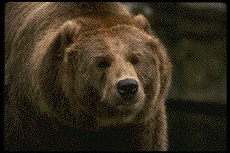 Bears and You in the North Cascades: Safety Tips for Travel in Bear Country
Bears and You in the North Cascades: Safety Tips for Travel in Bear CountryWritten by North Cascades National Park Staff w/ Barbara Borst Funded by the Skagit Environmental Endowment Commission The North Cascade Range in Washington State and British Columbia is home to many species of wildlife, including two bears, the black and the grizzly. This (guide) is particularly for visitors to North Cascades National Park, Ross Lake National Recreation Area and Lake Chelan National Recreation Area. These three areas are managed by the National Park Service and lie along the crest of the Cascades from the border of British Columbia south to Lake Chelan. The information here applies throughout a much larger area of public lands surrounding the national park. Take the precautions described to help ensure that your visit to this wild and beautiful area is safe and enjoyable. These precautions will also help achieve a fundamental goal of the National Park Service: to keep the wildlife in the protected areas of the North Cascade Range wild and neither attracted to nor dependent upon people.  USING THIS (GUIDE)
In these pages you will find suggestions to help ensure your safety in bear country, whether you are camping in the front country, boating, traveling with pack animals, or backpacking. Please remember that to camp overnight in the backcountry of North Cascades National Park, Ross Lake National Recreation Area, and Lake Chelan National Recreation Area (all of which make up the North Cascades National Park Complex), you need a free permit. You can obtain these permits in Marblemount at the Wilderness Information Station (360/873-4500) and in Stehekin at the Golden West Visitor Center (360/856-5700, ext. 340, then ext. 14). You may also get permits at other National Park and some U.S. Forest Service stations in the area. Frontcountry campsites (along roads in Ross Lake National Recreation Area, at Stehekin Landing, and on Lake Chelan) are first-come, first-served.
USING THIS (GUIDE)
In these pages you will find suggestions to help ensure your safety in bear country, whether you are camping in the front country, boating, traveling with pack animals, or backpacking. Please remember that to camp overnight in the backcountry of North Cascades National Park, Ross Lake National Recreation Area, and Lake Chelan National Recreation Area (all of which make up the North Cascades National Park Complex), you need a free permit. You can obtain these permits in Marblemount at the Wilderness Information Station (360/873-4500) and in Stehekin at the Golden West Visitor Center (360/856-5700, ext. 340, then ext. 14). You may also get permits at other National Park and some U.S. Forest Service stations in the area. Frontcountry campsites (along roads in Ross Lake National Recreation Area, at Stehekin Landing, and on Lake Chelan) are first-come, first-served. All visitors to the North Cascades National Park Complex can benefit from the information in this (guide). The section entitled "Basic Safety Tips for Hiking and Camping in Bear Country" should be read by everyone. If you plan to camp in the frontcountry, boat camp, travel with pack animals, or go backpacking, please refer to those sections toward the back of this (guide) for additional information on safety while practicing these activities in bear country.  THOUGHTS ON GRIZZLY AND BLACK BEARS
THOUGHTS ON GRIZZLY AND BLACK BEARSBlack bears and grizzly bears have many things in common. Both bears are highly intelligent and individualistic. Both sleep through most of the winter, and both eat many different foods, most of them plants. Through the course of a single year, both bears use a wide variety of habitats, from low valleys to high meadows. Both have good eyesight and an excellent sense of smell; they can detect scents miles away. Both are powerful, fact, and protective of their young. And both species vary greatly in the color of their coat - black bears are not always black and grizzly bears are not always grizzled - making it very difficult at times to distinguish between the two. Both black bears and grizzly bears learn quickly how to get food or garbage from people, a habit difficult to break if it can be broken at all. And both species are poached for the illegal trading of wildlife parts in black markets a world away. There are differences between black bears and grizzly bears, too. Grizzlies grow larger than black bears, and, as adults, are not the agile tree-climbers that black bears are. Although these differences may not be pronounced enough to tell some grizzly bears from some black bears, there are other distinguishing characteristics. Grizzlies, for example, have a hump at the shoulders, a concave rather than straight facial profile, and longer claws adapted for digging, which they do vigorously. Tracks can also be used to distinguish between the two bears. Grizzly bears can be more aggressively protective of their young and their food than black bears, though you should be very careful in the presence of either. Black bears are far more common than grizzlies in North America. They are found in 32 states, much of Canada, and parts of Mexico. Black bears are relatively numerous in the North Cascades. Grizzlies, in contrast, are rare in North America outside Alaska and parts of Canada, surviving on a small fraction of their former range. Consequently, the grizzly was federally listed as "threatened" in 1975 and is protected under the Endangered Species Act. In all of the North Cascade Range, from southern British Columbia to Snoqualmie Pass (I-90) there may be 15 to 30 grizzly bears, as a rough estimate. The U.S. Fish & Wildlife Service has designated a 7 million acre ecosystem in Washington State (including part of the North Cascades) as one of six recovery areas for the grizzly. It is illegal to hunt the grizzly bear in the North Cascades because it is a threatened species. The black bear can be hunted in certain areas (not in North Cascades National Park) of Ross Lake National Recreation Area and Lake Chelan National Recreation Area in accordance with Washington State law. When visiting the North Cascades, remember that for a little while you are sharing a place which is home to black bears and grizzlies. Both need your understanding and protection. You can do your part and also reduce your risk by taking the measures described in this (guide). Please report all bear sightings to a park ranger or call 360/856-5700. Note the location of the sighting, length of observation, distance from the bear, and description of the bear and its activity or behavior. 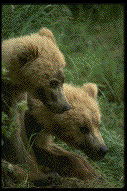 DIFFERENTIATING BLACK AND GRIZZLY BEAR TRACKS
DIFFERENTIATING BLACK AND GRIZZLY BEAR TRACKSBiologists use front tracks to distinguish bear species. You can do the same when you are out in the wilderness. Establish a line through the lowest point of the outside toe and the highest point of the palm pad. Notice that the black bear's inside (right) toe is mostly below the line, while the grizzly bear's is above the it. The rear foot on both species looks the same. 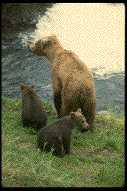 BASIC SAFETY TIPS FOR HIKING AND CAMPING IN BEAR COUNTRY
BASIC SAFETY TIPS FOR HIKING AND CAMPING IN BEAR COUNTRY KEEP A CLEAN CAMP & STORE FOOD AND FOOD-RELATED EQUIPMENT PROPERLY Bears to not naturally associate people with food, but they are opportunistic feeders. A bear drawn to a camp by the smell of garbage in a fire pit may discover containers of food on a picnic table and learn that campgrounds and campsites provide easy meals. The bear will remember this lesson for the rest of its life and pass the knowledge on to its young. A bear may seek food at camps aggressively and repeatedly over a long period. Bears who demonstrate this behavior have to be killed. By following basic precautions of proper food storage and camp cleanliness, campers can minimize encounters with bears. Bears are not the only animals readily corrupted by people and potentially injurious to you and your equipment and supplies. Rodents gnaw through packs, ravens peck plastic bags open, and deer strike with their hooves, all in search of an easy meal. The precautions described in this (guide) will help protect you and your belongings and will help keep wildlife truly wild. Please note that failure to store food properly or to maintain a clean camp can lead to citations under the Code of Federal Regulations (Title 36, CFR 2.10(d) and 2.14). HIKING SAFELY IN BEAR COUNTRY All trails in the park and recreation areas are in bear habitat. You could encounter a bear even on a short hike. Bears are individuals, each behaving differently in different circumstances. There are no precise rules about what to do if you encounter a bear, but there are generally effective measures to be followed. Always stay alert to your surroundings. Be especially wary in places where there is food favored by bears; for example, berries or carcasses of large animals. If you smell a dead animal, do not investigate! Leave the area and inform a ranger. Avoid startling a bear. Where sight distance is limited or flowing water is muffling sounds, make noise by talking, singing, shouting, or clapping your hands. Do not make shrill or high pitched noises as these may attract bears. Some hikers use bells for noise, but talking carries better, and bells may arouse a bear's curiosity. Be especially alert if hiking around dawn or dusk. Bears can be active at any time of the day or night but are more often encountered at those times. It is best to not hike alone. Bears are less likely to approach several people. If you are hiking with children, make sure they stay with you at all times. If dogs are permitted where you are hiking, keep yours on a leash and under your control. Loose dogs disturb wildlife and may lead a bear back to you. (Note: Dogs are permitted in Ross Lake and Lake Chelan National Recreation Areas, along roads and the Pacific Crest Trail in North Cascades National Park. Dogs must be kept on a leash and under your control at all times.) Be watchful when traveling off trail. Bears rest and sleep in day beds; for example, next to a log, in dense brush, the depression of a fallen tree, or out in a grassy meadow. If you see a bear, do not approach it to take a photograph or for any other reason. If the bear has not seen you, calmly leave the area while talking aloud to make it aware you are there and are moving away. Most bears will leave when they see or hear you. If you cannot change your route to avoid a bear, try shaking leafy branches (don't break them off trees or shrubs), snapping small downed limbs with your feet, and talking in a loud but low tone. Bears often communicate their discomfort at being too close to one another by snapping small branches. You may need to do these things repeatedly before they have any effect. Do not come between a bear and her cubs. Bears are very protective of their offspring. A bear stands up to better identify what you are, not to threaten you. If a bear approaches you, do not scream or run or make sudden motions. You cannot outrun a bear, and screaming may increase the danger of the situation. Do not shoot the bear. A wound is likely to do more than anger the animal and will greatly increase the danger to you. Bear repellents (such as pepper spray), even when effective, only work at such close range that depending on them could endanger you. Horns are unproven in their effectiveness. High pitched noises can arouse curiosity or anger in bears. Bears are curious and may want to "check you out." Try to avoid direct eye contact, which a bear may see as a threat. Generally, if you just stand your ground, the bear will soon leave. Wild bears rarely attack unless threatened or provoked. Talking in low, soothing tones may help keep you calm. Do not panic. If a bear approaches you very quickly, drop a hat or bandanna (but not your pack or anything else associated with food) and move away without running. The bear may stop to examine what you have dropped, distracting it from you. Offensive attacks by bears are very rare. It is difficult to generalize accurately about the reasons for attacks or what to do when they occur. Most attacks thought to have been predation involved black bears, while most attacks by grizzly bears have been defensive, especially by females with cubs. Every instance is different, and what works best cannot be known with certainty in advance. If a black bear attacks you, fight back with rocks, sticks, equipment, or your bare hands if nothing else is available. Aim for the bear's eyes or nose. A grizzly bear with young or protecting a food source may want to make sure you are not a threat. People have weathered grizzly attacks by dropping into a "cannonball position" with neck and face between the knees. If the bear takes you out of this position, try to resume it. Usually, the bear will see that you are not a threat and will leave you alone. Do not take the offensive against a bear with cubs. Every encounter with a bear is different because bears, like people, differ from each other. Also, black bears and grizzly bears can be difficult to tell apart. Size and color are not distinguishing characteristics. 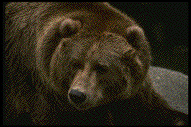 CAMPING IN BEAR COUNTRY
CAMPING IN BEAR COUNTRYThe following suggestions and instructions apply to anyone camping in the North Cascades. Bears use a wide range of habitat. Anywhere you travel in the Cascades is bear country. After reading the next section, please refer to the pages that pertain to your activities in the park for additional information on safety in bear country, whether you are camping in the front country, boating, traveling with pack animals, or backpacking. Food Storage Use animal-resistant, food storage boxes at campgrounds equipped with them. Never leave food or trash in these boxes when you move on. Take at least 50 feet (15 meters) of parachute cord or rope on backcountry or boating trips. If the campground lacks a food storage box, place your food, cooking gear, and toiletries in a bag. Choose a tree at least 100 yards (90 meters) from your tent, if possible, and downwind. You want the food bag to be visible from a distance as you approach. Suspend the bag from a limb of the tree so that it is at least 10 feet (3 meters) from the ground and 4 feet (1.2 meters) from the trunk. Plastic coated bags are best for food hanging because they help seal in odors and are less easily chewed by rodents. Nylon stuff sacks and garbage bags lack these properties. Avoid contaminating sleeping gear with food odors; do not use sleeping bag stuff sacks, tent sacks, or clothing bags for food storage. Bear resistant canisters are available commercially and will keep out rodents as well as bears. Contact the park for the address of vendors. Hang canisters in a tree at least 100 yards (90 meters) downwind of your tent or at least tie them to a rock or tree to keep the canister(s) from rolling away. Remember to hang empty food packaging, garbage, cooking pots and utensils, cosmetics, sunscreen, insect repellent, soap, toothpaste and any other fragrant item with your food. Never keep any food, or anything that held food, in your tent. Camp Sanitation Choose another camping area if you find a large, dead animal in or near your camp. Never cook or eat in your tent. Strive for a clean camp free of odors. Bears and other animals are attracted to the smell of cooking and food waste. Avoid cooking fragrant foods like meat and fish. Hang and store garbage as described under Food Storage for food and toiletries. Fires are permitted only in the pits provided for them. Do not burn trash or garbage; doing so may leave odors that attract wildlife. If food falls into the fire pit during cooking, make sure it burns to ash. Do not dispose of garbage in the toilet. Wash your dishes right after you eat. Keep soap out of lakes and streams. Even biodegradable soap will contaminate fresh water. Collect all grey water from cooking and washing and dump it in the campground vault toilet, pit toilet, or camper sink. (See specific sections below for important additional information on disposal of grey water.) Urine odor attracts wildlife. Please use toilets where they are provided. Otherwise, urinate on rocks, snow, or bare ground. Do not sleep in clothes that have food odors. It is best to sleep in different clothes from those in which you cooked or ate. Clothes contaminated with food odors should be stored as described above for food. Sleeping in a tent is safer than sleeping without one. Hunting is permitted in the national recreation areas with a Washington State hunting license. Fishing is permitted in the recreation areas and the national park with a Washington State fishing license. If you hunt or fish and then camp, store game, meat, or fish as carefully as food. After puncturing the air bladders, drop fish entrails in deep water at least 200 feet (60 meters) from docks and swimming areas, and, if possible, at least 100 feet (30 meters) from shore to allow natural decomposition. Do not dispose of fish entrails in the toilet. Pets Dogs are allowed in Ross Lake and Lake Chelan National Recreation Areas but must be on a leash and under human control at all times. Dogs disturb wildlife. A loose dog could lead a bear back to you. Dogs are not permitted in North Cascades National Park except on roads and the Pacific Crest Trail. 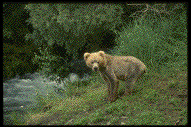 If Your Campsite is Visited by a Bear
If Your Campsite is Visited by a Bear If a bear comes into your frontcountry campsite, contact a ranger. If you are at a backcountry site and no ranger is nearby, do not approach the bear but try to make it leave by shouting, shaking branches, or banging pots and pans. A bear accustomed to campground food may not be easily discouraged. If a bear persistently returns to the camp, move to another campground and notify a park ranger. CAMPING WITH A CAR, RECREATIONAL VEHICLE, OR BICYCLE Bears sometimes enter campgrounds that are along park roads. You may see them on trails leading from these frontcountry campgrounds. Wherever you are camped in the park, try to reduce or eliminate odors that attract bears. Do not assume that because you are not in the backcountry bears will not come into your camp. When you go to bed or away from your campsite, store all your food, toiletries, cooking gear, coolers, empty boxes that contained food, and stove in your vehicle with the windows up and doors locked. Remember to secure portable barbecue grills too. Your car trunk is best place to store these things. If your pickup has a fabric shell, store items in the cab. Before you leave your site or go to bed, deposit all your garbage and trash in the bear resistant trash barrels. If you do not have a vehicle, ask someone in the campground who does to let you store your food and cooking gear in their vehicle. If this is not possible, hang your food and other items as described (previously). Thoroughly clean your cooking and eating areas right after eating. Deposit wash water in the vault toilets in campgrounds equipped with those (Goodell Creek Campground, for example) and in the camper sinks located at each restroom in Colonial Creek and Newhalem Creek Campgrounds. Pour grease into a container you will be throwing away and put it in the trash cans or dumpsters. Do not pour wash water or grease on the ground or down a rodent hole. It is best not to bring pets to the national park and recreation areas. If you do, keep them on a leash and under your physical control at all times. Free running pets disturb wildlife and may lead bears back to you. If you need to walk anywhere at night, use a flashlight to lessen the chances of startling or being startled by wildlife. If you have been fishing on Diablo Lake, use the fish cleaning station at Colonial Creek Campground to clean your fish and dispose of the entrails. BOAT CAMPING There are boat-in campgrounds on Ross and Diablo Lakes in Ross Lake National Recreation Area and on Lake Chelan in Lake Chelan National Recreation Area. Those on Ross and Diablo Lakes require a free backcountry permit. In addition to the measures described (previously): If there is not bear box and no tree limb suitable for food hanging or you have more food than you can hang this way, put it in a hard-shell container with a tight lid such as a cooler or plastic tote box. Fasten the lids securely and weight each with a heavy object to protect the containers from marauding raccoons. These containers are not bear resistant. Lacking containers, use plastic bags and close them as tightly as possible to limit odors. Store the containers or bags in your boat; do not leave them unattended in your campsite or anywhere near where you are sleeping. Store food as described here even if you are using one of the Ross Lake island campsites. Bears can swim! BACKCOUNTRY CAMPING WITH PACK ANIMALS In addition to the measures described (previously): Store your animals' feed the same as your food. Do not keep panniers that have contained food or cooking equipment near where you are sleeping. It is best to have them at least 100 yards (90 meters) away downwind and (if they contain food or other fragrant items) hung 10 feet (3 meters) up and at least 4 feet (1.2 meters) out from the nearest tree trunk. If you are not using panniers, hang any equipment which may have food odors associated with it. There are bear resistant panniers. Contact the park for sources and for suggestions on packers with experience in bear country who you could talk with. BACKPACKING In addition to the measures described (previously): Some backcountry camps in the North Cascades have composting or vault toilets. Do not throw grey water into these. Remove or strain all food particles from grey water and pack out the particles with your garbage. Scatter your grey water over a wide area well away from the camps and water sources. Some campsites in North Cascades National Park have bear poles (with hooks mounted high and another pole for lifting your food bag up to the hooks). Use these devices where they exist. If you have a permit to camp in a crosscountry zone, where there are no toilets, urinate well away from camp on rock, sandy areas, or duff. Animals are attracted to salts in urine, and their pawing damages vegetation. Try to cook at least 100 yards (90 meters) downwind of your sleeping area on snow or bare rock to minimize your impact. Cook no more food than you can eat. Avoid using soap; it contaminates water sources. Strain and dispose of the grey water as described in the first paragraph above. |
 Back to animals
Back to animals